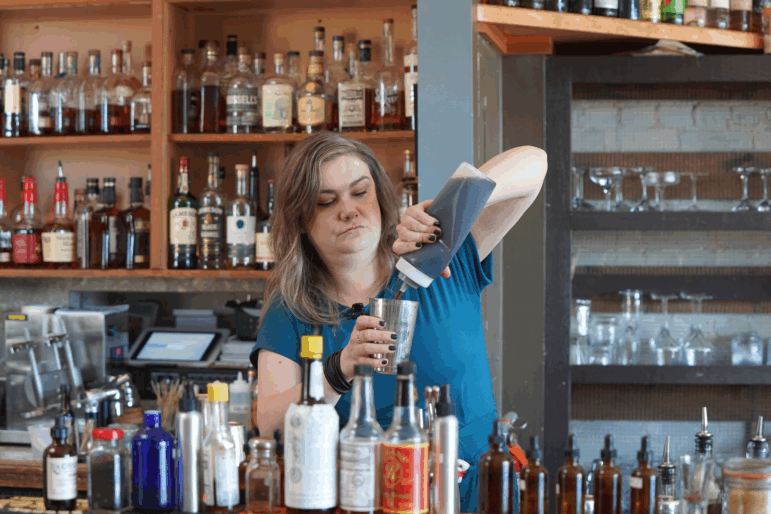ASHEVILLE, N.C. — Last September, Brandon Davis had just opened the business of his dreams.
The funky 70s-themed bar known as Day Trip sat near the banks of Asheville’s French Broad River. Davis and his husband, Davie, poured their heart into creating a space that was warm, welcoming and teeming with vintage wares. The bar was open for a month before the floodwaters from Hurricane Helene tore through the space, leaving a nasty mess.
“Everything was covered in sewage from the ceiling to the floor,” Davis recalled. “All of the antiques that I had been collecting and the vibe that I had curated. And to see it all just covered in crap and waste and dirt and mud. It was a big bummer.”
It wasn’t just places directly along the river that suffered. The storm ripped out the city’s water main and left residents without power, internet and cell service for weeks. Landslides ate houses, roads and other crucial pieces of infrastructure.
“Our immediate concern wasn’t the bar. Our immediate concern was, we don’t have food or internet or power and we have four cats and we have a dog. How do we get fresh water?” Davis said.
Nearly everyone in western North Carolina has a version of this story. For weeks, the entire region shifted to survival mode. Tourism ground to a halt just ahead of October, the biggest season for visitors. And most businesses either paused operations or gave away their services for free, resulting in average losses of $322,000 per small business.
Now, a year after the storm, the economy is still not where it was before Helene hit. As October rolls back around bringing vivid mountain colors with it, the hospitality industry is hanging its hopes on the return of tourists, ideally in numbers strong enough to carry them through the winter.
“There are a lot of small businesses that have scraped everything they had and a ton of debt together to reopen,” Davis said. “We are dependent on tourism to keep us going and to get us out of the hole that we are in right now.”
Davis, the Day Trip owner, considers himself one of the lucky ones. They raised $200,000 through a fundraising campaign after the storm. The money allowed him to pay off most of the loan on his original location and reopen at a new spot – on higher ground.
On a Sunday evening, the new, colorful space is full of guests sipping on PBRs and cucumber mezcal cocktails that are aptly named “Everything in its Right Place.”
It’s a reassuring scene after a year of heartache. But that doesn’t mean Davis is impervious to economic headwinds. Demand for vacation rentals in Asheville has dropped by around 20% since Helene.
“Each month is terrifying when it comes time to pay our rent and our utilities and everything for the bar,” he said.
Kala Brooks, the manager of a craft cocktail bar named Top of the Monk, said it’s been a time of reckoning for the industry.
“The choice to stay or go has been so demanding and so challenging for so many people,” she said. “We lost a lot of really great, qualified people in the service industry.”
Before Helene, Brooks managed a team of more than 20 people at The Top of the Monk, along with the downstairs brewery, Thirsty Monk, a downtown Asheville fixture. But the 18-year old brewery had to shut down after losing its production facility in the floods. Today, Brooks is down to four employees.
“There is definitely a feeling of helplessness, because as a manager, I feel like I should be driving this business,” Brooks said. “I should be making these decisions that help us stay open, profitable and lucrative. But at the same time, I can’t physically bring people in the door.”
There are thousands of hospitality workers in Asheville in the same boat as Brooks, making less money than last year and dealing with things like housing instability, insurance headaches and mental health challenges.
Jay Slusher, a server at Golden Hour, a restaurant in the River Arts District of Asheville, said after Helene, he considered leaving town.
“There were times this winter where it really came home, where I felt lost. ‘What am I going to do? Am I going to be able to survive here in Asheville? Will the jobs come back? Will the tourists come back?'” Slusher said.
But he’s hopeful that the tourism boom will come back. He said the time he spent unemployed over the winter made him realize how much he loves welcoming newcomers to town.
“I really have come to terms that I love hospitality,” he said. “I love meeting new people. Beforehand I took it for granted.”
Brooks, for her part, is channeling her angst about the future into a batch of new seasonal cocktails.
“It’s been really, really challenging,” she said. “But it’s also a period of rebirth and change.”

